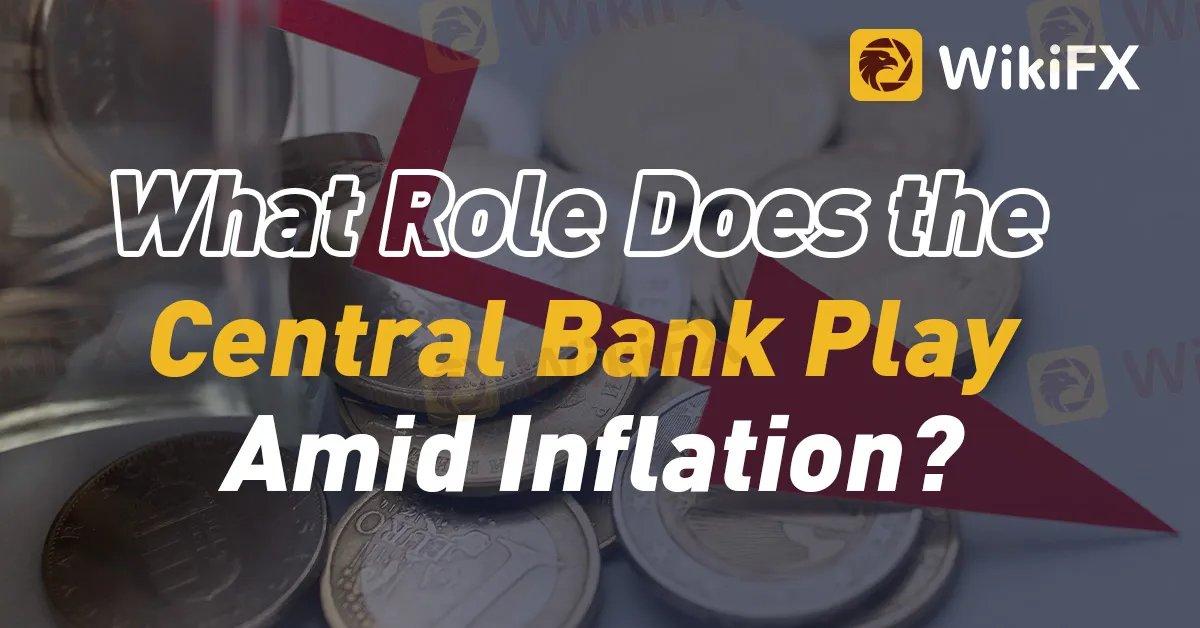WikiFX Trending Topics Analyst Initiative
Share Your Expertise on What’s Moving the Market.
简体中文
繁體中文
English
Pусский
日本語
ภาษาไทย
Tiếng Việt
Bahasa Indonesia
Español
हिन्दी
Filippiiniläinen
Français
Deutsch
Português
Türkçe
한국어
العربية
Abstract:Inflation, the persistent rise in the general price level of goods and services over time, poses a significant challenge to economies worldwide. During periods of inflation, central banks assume a critical role in implementing measures to stabilize prices and maintain economic stability. So what can central banks exactly do in the face of inflationary pressures?

Introduction
Inflation, the persistent rise in the general price level of goods and services over time, poses a significant challenge to economies worldwide. During periods of inflation, central banks assume a critical role in implementing measures to stabilize prices and maintain economic stability. So what can central banks exactly do in the face of inflationary pressures?
Central banks have the primary responsibility of formulating and implementing monetary policy. In times of rising inflation, central banks employ various tools to control the money supply and influence interest rates. Through open market operations, reserve requirements, and discount rates, they regulate liquidity in the financial system, aiming to curb inflationary pressures by moderating spending and investment.
To ensure effective decision-making, central banks often operate independently from political influence. Independence allows central banks to focus on long-term economic stability rather than short-term political considerations. This autonomy strengthens their ability to implement appropriate policies to combat inflation, as decisions can be made based on economic indicators and expert analysis.
One of the main goals of central banks is to maintain price stability within an economy. They strive to keep inflation rates low and stable, typically targeting a specific inflation rate. Central banks closely monitor key economic indicators, such as consumer price indices, to gauge the level of inflation and take appropriate actions to ensure stability.

Inflation can be influenced by changes in interest rates, which affect borrowing costs and consumer spending. Central banks use interest rate adjustments as a tool to manage inflation. By raising interest rates, they aim to dampen demand and reduce spending, which can help control inflationary pressures.
Central banks play a vital role in managing the country's currency, especially during inflationary periods. They employ foreign exchange interventions to stabilize the domestic currency's value in relation to other currencies. By buying or selling foreign currencies, central banks influence exchange rates, thereby mitigating inflationary impacts stemming from imported goods and services.
Central banks recognize the importance of clear communication and transparency in managing inflation expectations. They regularly provide public statements, press releases, and reports to explain their policy decisions and economic forecasts. By effectively communicating their strategies, central banks aim to influence market expectations, anchor inflationary pressures, and maintain public confidence in their ability to control inflation.
Conclusion
Inflation poses a significant challenge to economic stability, and central banks play a pivotal role in addressing this issue. Through their management of monetary policy, control of interest rates, currency management, and commitment to price stability, central banks aim to curb inflationary pressures and maintain a healthy economic environment. Their independence and transparent communication further enhance their effectiveness in combating inflation. Understanding and supporting the crucial role of central banks is essential for fostering sustainable economic growth while keeping inflationary forces in check.

Disclaimer:
The views in this article only represent the author's personal views, and do not constitute investment advice on this platform. This platform does not guarantee the accuracy, completeness and timeliness of the information in the article, and will not be liable for any loss caused by the use of or reliance on the information in the article.

Share Your Expertise on What’s Moving the Market.

In a forex market where fundamental and technical factors impact the currency pair prices, volatility is expected. If the price volatility acts against the speculation made by traders, it can result in significant losses for them. This is where a stop-loss order comes to their rescue. It is one of the vital investment risk management tools that traders can use to limit potential downside as markets get volatile. Read on as we share its definition and several strategies you should consider to remain calm even as markets go crazy.

The forex market is a happening place with currency pairs getting traded almost non-stop for five days a week. Some currencies become stronger, some become weaker, and some remain neutral or rangebound. If you talk about the Indian National Rupee (INR), it has dipped sharply against major currencies globally over the past year. The USD/INR was valued at around 85-86 in Feb 2025. As we stand in Feb 2026, the value has dipped to over 90. The dip or rise, whatever the case may be, impacts our daily lives. It determines the price of an overseas holiday and imported goods, while influencing foreign investors’ perception of a country. The foreign exchange rates change constantly, sometimes multiple times a day, amid breaking news in the economic and political spheres globally. In this article, we have uncovered details on exchange rate fluctuations and key facts that every trader should know regarding these. Read on!

Understanding how to add funds to your account and, more importantly, how to take them out is essential for safe trading. For any trader thinking about ACY Securities, making an ACY SECURITIES deposit is simple, but the ACY SECURITIES withdrawal process has many serious complaints and concerns. While ACY says it is an established, regulated broker, many users have complained specifically about withdrawal problems, creating a confusing and often contradictory picture. This guide provides a complete and critical analysis. We will first explain the official steps for deposits and withdrawals, including methods, fees, and stated timelines. We will then take a deep look at patterns found in over 180 real user complaints, examining the potential warning signs and risks. By combining official information with real-world user experiences and regulatory warnings, this article aims to give you the clarity needed to make an informed decision about the safety of your funds with ACY Securities.
